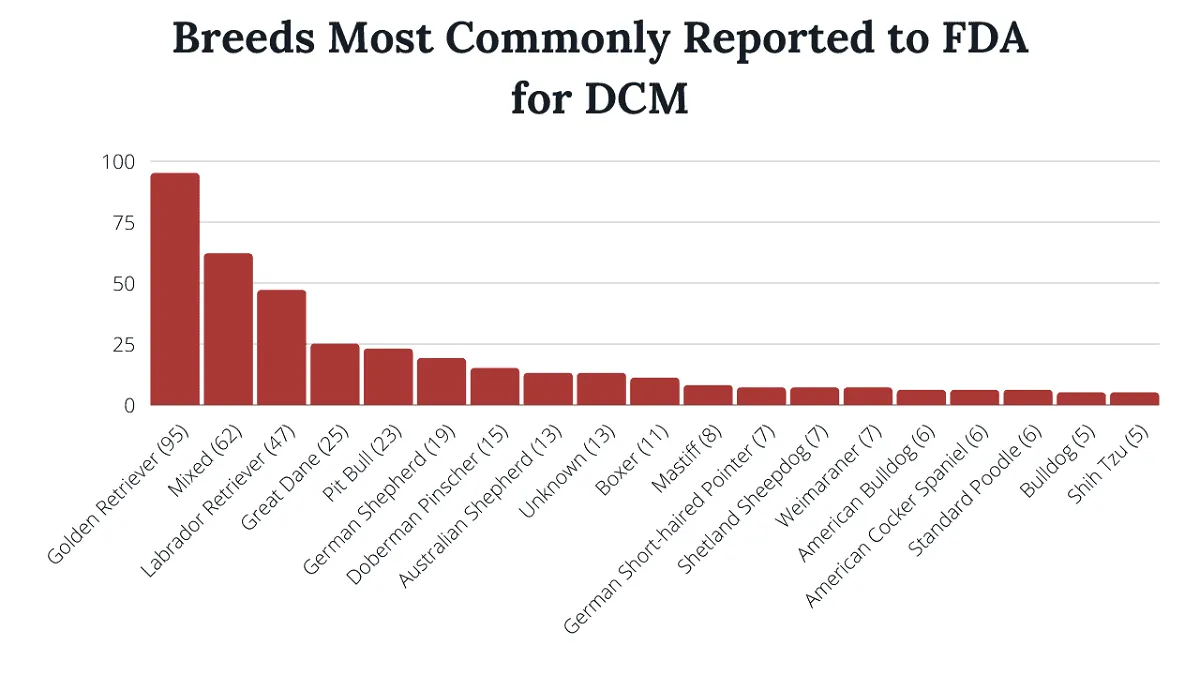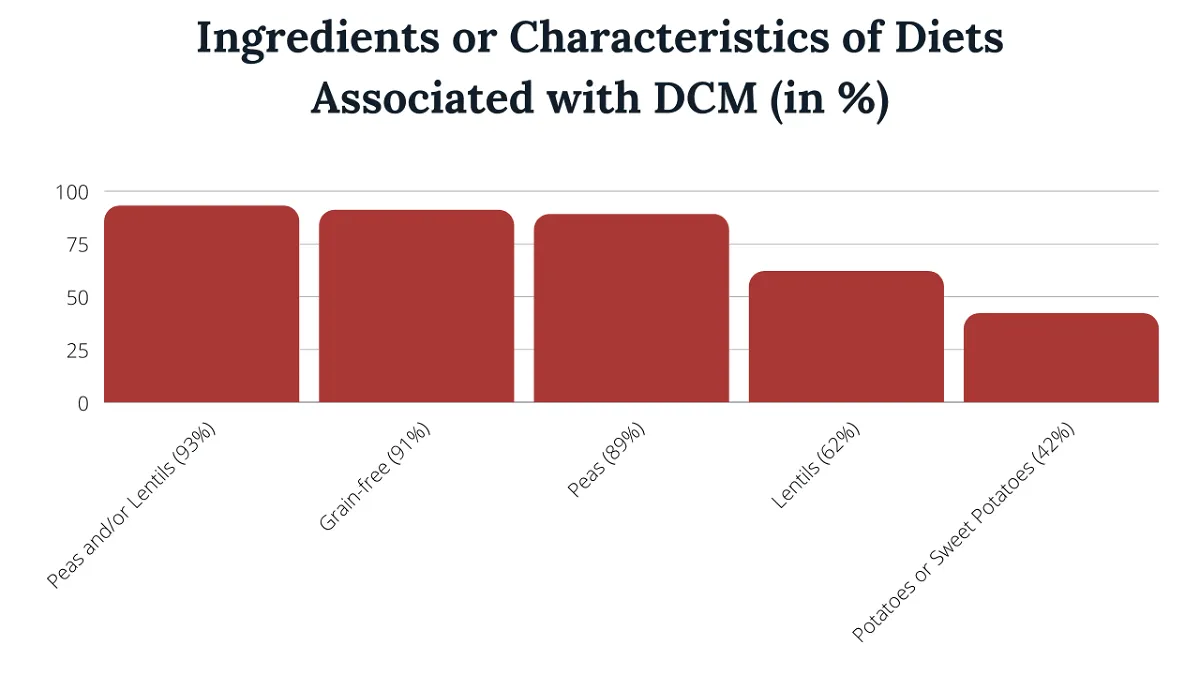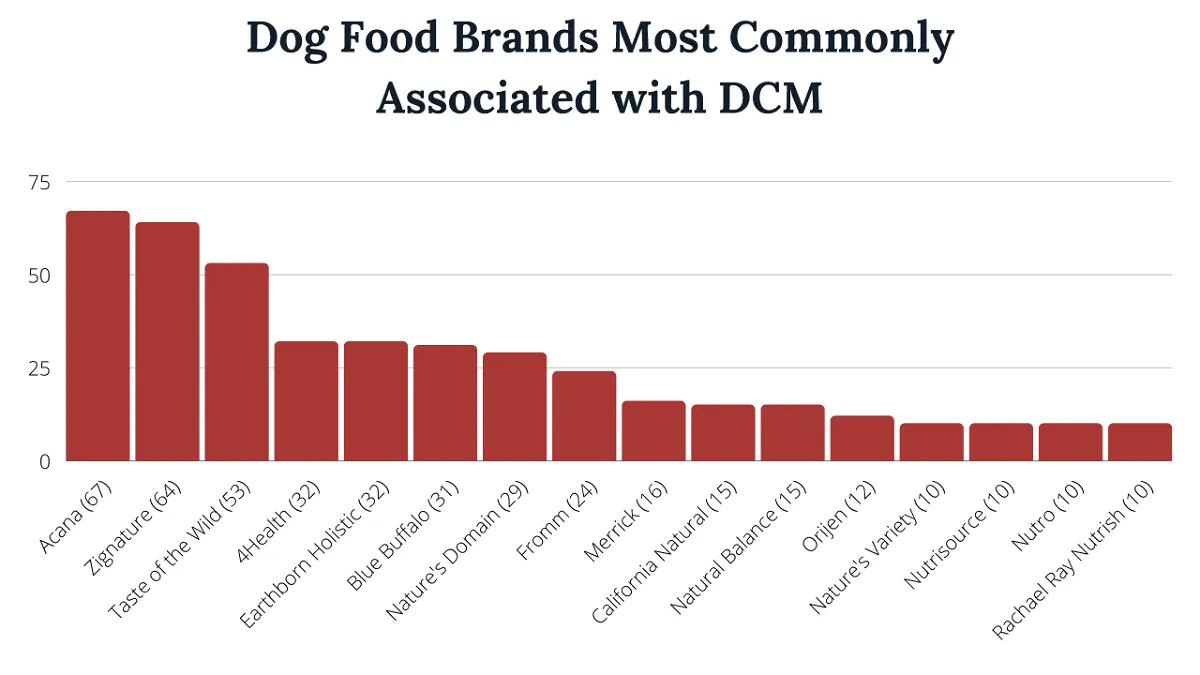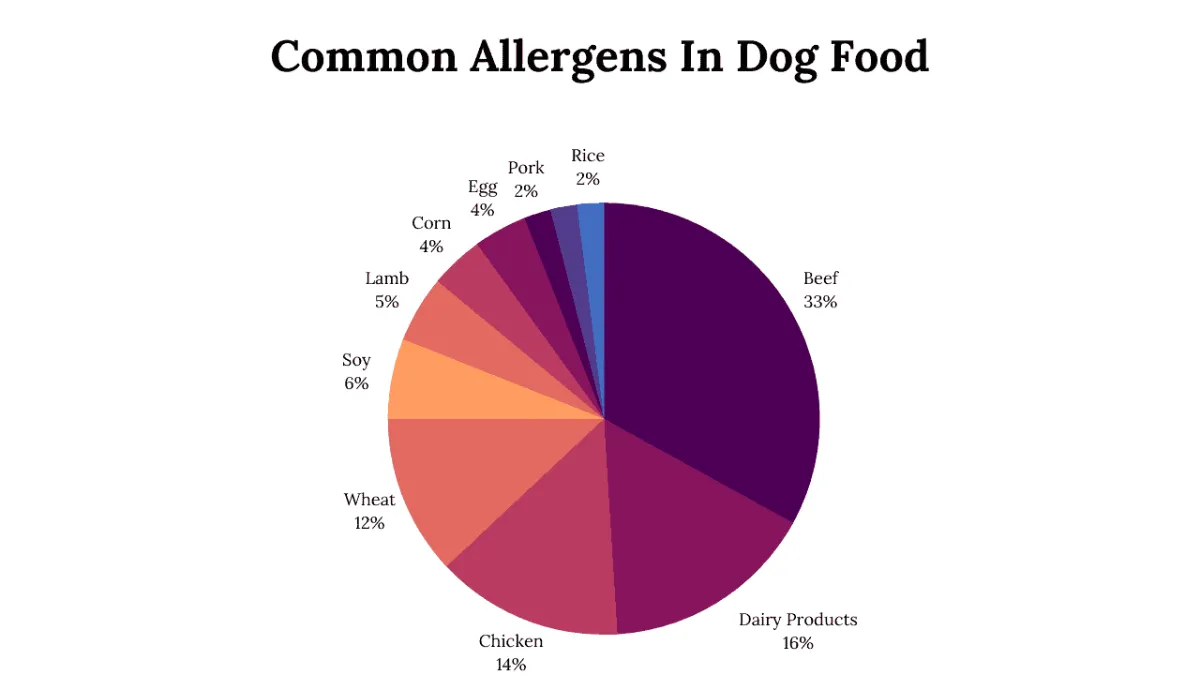
The grain vs. grain-free diet is one of the most debated topics when it comes to dog diets. This is no wonder because due to marketing, grain-freeness is now equal to health in the minds of many pet owners.
However, based on some observations and reports, it is conceivable that a grain-free diet is not the best for dog health.
In my article, I have tried to examine the issue from as many sides as possible.
It is not my intention to decide for you whether to buy grain-free or grain-containing dog food. However, I am confident that you will be able to make a responsible decision with the help of your veterinarian based on the data and information I provide.
Let’s start!
FDA investigation into the link between heart disease and diet
Yes, if the FDA initiates an investigation into a brand or diet, it is usually a cause for concern.
For example, a study by the FDA investigating the association between grain-free diets and developing certain heart disease (dilated cardiomyopathy) in dogs has been published.
This is because there have been many reports that dilated cardiomyopathy (DCM) has developed in canines that have been on a grain-free diet for months or years. Among the first ingredients in these dog foods were legumes (beans, peas, lentils) or potatoes.
Between January 2014 and April 2019, the FDA received 524 reports. In many cases, more pets in the reporting households suffered from the problem, so, in fact, there were well over 524 animals.
The situation is exacerbated by the fact that although DCM is not uncommon in dogs, the above cases often occurred in breeds that are not prone to heart disease.
The research results were published in June 2020, among others, in the Journal of Animal Science.
Despite all previous discussions and suspicions, the experts found no clear evidence between the grain-free diet of dogs and DCM development. I think it is worth believing the conclusion, as there have been nearly 150 studies on the subject.
This can sound reassuring to dog owners who feed their little ones a grain-free diet. However, experts want to carry out further investigations, as it would be crucial to find out exactly what caused the more than 500 cases mentioned above.

What is Dilated Cardiomyopathy?
Dilated cardiomyopathy, or DCM, is a type of heart disease. It is common in both humans and dogs. During this condition, the heart muscle weakens, so the pumping of blood also becomes insufficient. This can lead to serious problems such as congestive heart failure.
This heart disease is prevalent in large dog breeds such as Saint Bernards, Doberman Pinschers, or Newfoundlands. Of the smaller breeds, the Cocker Spaniel is the one that often develops this condition.
Because of the above, it was quite striking when reports submitted to the FDA developed DCM in many dog breeds that had not previously been observed to do so.
Are fancy diets to blame for everything?
In recent years (mainly thanks to the Internet), fashionable diets are becoming more and more widespread. People eat more consciously, try to live healthily, lose weight (or even gain weight), and so on.
Certain trends are also prevalent among pets. For example, a grain-free diet may be absolutely recommended if your dog is allergic to grains. However, many pet owners believe that grain-free diets are healthier in all cases.
Well, you need to discuss your dog’s diet with your vet. But many experts think that (as long as there is no sensitivity or allergy), because of the possible link between DCM and a grain-free diet, you may want to choose grain-inclusive dog food for your pooch.
Anyway, it’s not just the grain-free diet that’s so popular among the novelties. More and more pet owners choose the so-called “BEG” diets (boutique, exotic, and grain-free) due to media and marketing.
In the Journal of the American Veterinary Medical Association on December 1, 2018, Lisa M. Freeman wrote that BEG diets had become the main suspects in causing heart disease.
These (in addition to grain-free) contain unusual ingredients, rare animal meats (e.g., kangaroo), vegetarian, and even vegan formulas. They practically contain a lot of ingredients, with even more special and unique combinations.
Because of this, I think it’s obvious why it’s so hard to figure out exactly which ingredient (or lack of an ingredient) is what causes DCM in dogs. It is also conceivable that the problem is not one component but a unique combination of several, possibly components.
BEG diets are chosen by owners who, for marketing reasons, want to give their dogs the healthiest food possible for health reasons. Although the link between heart disease and the formulas mentioned above has not yet been clearly demonstrated, I still suggest that you consider products that contain the usual ingredients.

Which dog food brands were involved in the FDA investigation?
The FDA’s latest update for 2019 includes 16 brands that have been featured ten or more times in the reports submitted. Reports include mainly dry dog foods. I also wrote the number of reports in parentheses next to the brands.
- Acana (67)
- Zignature (64)
- Taste of the Wild (53)
- 4Health (32)
- Earthborn Holistic (32)
- Blue Buffalo (31)
- Nature’s Domain (29)
- Fromm (24)
- Merrick (16)
- California Natural (15)
- Natural Balance (15)
- Orijen (12)
- Nature’s Variety (10)
- Nutrisource (10)
- Nutro (10)
- Rachael Ray Nutrish (10)

So what conclusion should we get anyway?
As mentioned above, the association between grain-free and BEG diets and DCM has not yet been fully confirmed.
However, there are reports that the condition of dogs with DCM has improved after stopping these diets. In addition, the replacement of an amino acid called taurine has also alleviated the condition in dogs with heart disease.
Although it is not an essential amino acid, it can still be helpful for dogs with heart problems to supplement it. In such cases, it may be especially beneficial to buy dog food with taurine.
The point is that the harmfulness of BEG diets has not been proven, but caution does not hurt.
If your dog is on a grain-free or BEG diet, you may want to monitor his condition. Talk to your veterinarian about problems and any concerns. And be sure to accept his advice. A suitable specialist can spot the tiniest symptoms of heart disease.
Finding the best diet for your dog is not easy. You have to consider several aspects, e.g., activity, breed, age, health condition, etc. If you want to make the best decision possible, check out my comprehensive guide on how to choose the best dog food.
Can dogs eat grains?
The ancestors of the dogs most closely resembled carnivorous wolves. For this reason, many people think that dogs also perform better on a meat diet, and their digestive systems are unsuitable for carbohydrates.
Well, that’s not entirely true. This is because dogs can digest plants and carbohydrate sources (including grains). This is indicated mainly by the length of their intestines.
Another critical issue in this regard is amylase. This digestive enzyme is a great help in digesting plant nutrients. Many people know that dog saliva does not contain amylase. However, this is not a problem as they produce this enzyme in their pancreas. As a result, starches and other carbohydrate sources can also be broken down in the digestive system of canines.
Nor should it be forgotten that wolves (and other carnivores) tend to graze grass and consume other plant content from the stomachs of prey animals.
Thus, dogs have adapted perfectly in recent millennia to digest carbohydrate sources and grains. In addition, these ingredients provide not only valuable energy but plenty of useful nutrients for all canines. But, of course, the situation is different in the case of grain sensitivity or allergy.
Benefits of grains in dog food
Now that we have clarified that it is not a problem for dogs to digest grains let’s talk about the benefits.
Taste
Like humans, dogs love the taste of grains. Of course, real meat is much tastier for them, but tossing the diet with a little brown rice or oats can be a good idea.
Fiber content
Fiber is extremely important for proper digestion as it creates a beneficial environment for good gut bacteria. In addition, the high fiber content helps maintain optimal body weight. Brown rice is high in dietary fiber, making it one of the best grains.
Vitamins, minerals, and antioxidants
In essence, you could write a book about how beneficial vitamins, minerals, and antioxidants are in a dog’s diet. In essence, they have a positive effect on overall health. Grains contain many of these micronutrients.
It is important to note that the above benefits only apply to whole grains. These are grains that contain everything and are minimally processed. (Therefore, brown rice is better than white because it contains the grain of the fibrous bran, the nutritious germ, and the carb-rich endosperm.)
How do you know if your dog is allergic to grains?
Dog food allergies are not uncommon. Certain proteins can trigger allergic reactions, and many canines suffer from this problem. Because grains also contain proteins, grain allergies are a condition that many pet owners face.
However, you should know that grains are much rarer allergens, such as beef or chicken. The picture below shows the most common allergens in dog food:

Various food allergies, sensitivities, or intolerances may include the following symptoms:
- Diarrhea
- Itching
- Sneezing
- Hot spots
- Hair loss
- Rashes
- Scaly, oily, or pigmented skin
- Leathery skin texture
- Excessive discharge in the eyes
- Red eyes
- Ear, yeast, or bacterial infections
If your dog’s food contains grain with gluten (such as wheat), this should be the first thing you suspect in case of allergic reactions. If you notice any of the above symptoms in your dog, contact your veterinarian immediately to discuss the possible causes and treatment.
It is important to eliminate grains from your dog’s diet only if it is 100% proven that these ingredients are causing the problem. A grain-free diet does not help with sensitivity to other ingredients.
Related Dog Nutrition Guides:
Choosing the most suitable grain-free food for your dog
So you have come to the decision that you want to provide grain-free food for your dog. In this case, you need to be able to choose the best one. Below I describe the characteristics that characterize the best grain-free dog food.
- Animal protein: Protein is practically the most important nutrient for dogs. Proteins provide the amino acids needed to build and regenerate cells. In addition, they are excellent sources of energy and also help maintain optimal body weight. Animal proteins have a higher biological value. Therefore, it is best if the first ingredient in the dog food of your choice is real meat or meat meal. The latter can be beneficial as it also contains parts of the animal, such as cartilage. Thus, it can give very good content of glucosamine and chondroitin to dog food.
- Healthy fats: Fats are great sources of energy, and they are involved in many physiological processes. Not to mention that many vitamins can only be dissolved and absorbed in fat. The best sources are animal fats (chicken, lamb, beef) as well as fish oil. The latter also contains omega fatty acids, which have been shown to have beneficial effects on skin and coat health and inflammation.
- Moisture: Adequate fluid intake is essential for dogs. Therefore, if you choose dry food, always provide enough fresh water for your pup. About 70-80% of wet dog food is moisture, making it more similar to a natural carnivorous diet. But, of course, even in this case, it is worth paying attention to enough water.
- Useful nutrients: We have already talked about vitamins, minerals, and antioxidants. They improve digestion, the functioning of the immune system, have a good effect on the eyes, brain, skin, and coat. The best sources of vitamins, minerals, and antioxidants are fresh organic fruits and vegetables. Most manufacturers also add these micronutrients to their recipes in supplemental form. Always check the ingredient list to discover these valuable blends. You should also find out what are safe and harmful fruits and vegetables for dogs.
- Taurine: Taurine is a non-essential amino acid, meaning dogs can synthesize it from other amino acids. However, observations showed that taurine replacement caused a significant improvement in dogs (and cats) with heart disease. That is, if you definitely want to keep your dog on a grain-free diet, you should still choose a dog food with added taurine.
What to avoid?
Of course, you don’t just have to pay attention to what ingredients you need in good grain-free dog food. There are sources of protein and carbohydrates or compounds that do not fit into quality dog food. With these ingredients, you should definitely take care to avoid the worst dog foods or the wrong dog treats:
- Unnamed meat meal and bone meal: Meat and bone meals can contain very valuable nutrients. However, if these ingredients come from an unspecified source, it can be a problem. This is because you cannot control the quality in such cases, and there is a chance that the meal is made from meat to which your dog is sensitive. Therefore, a chicken meat meal is a much better choice than a poultry meal or a meat meal.
- By-product meal: The situation is a little worse with by-products than with meat meals. These are animal sources that are unfit for human consumption (chicken legs, claws, intestines, etc.). So why would you give this to your dog? The truth is that some valuable nutrients may be present in these ingredients (glucosamine, e.g.). However, it would help if you made sure that the dog food you choose does not have any by-product meals as the primary source of protein.
- Artificial ingredients: These compounds are not good for your dog’s health. Preservatives increase shelf life but can cause sensitization in some dogs. In addition, a preservative called BHA is a known carcinogen. Flavor enhancers and colors are also not very healthy. In addition to all this, you need to ask yourself the question: how good can the ingredients in a product be if artificial colors and flavor enhancers are needed for production?
Frequently asked questions
Below I have answered any further questions you may have about this topic:
Why do vets not recommend grain-free dog food?
Based on the FDA’s warning and investigation, we can rightly be wary of giving grain-free food to our dogs. However, the link between heart disease and diet has not yet been proven. Nevertheless, experts recommend that if your dog is not allergic or sensitive to grains, choose grain-inclusive dog food.
What grains can I add to my dog’s food?
You can give essentially any grain to your dog that does not cause sensitivity or other problems. Unfortunately, the most common allergen grain is gluten-containing wheat. So this is not the best idea for your dog’s diet. The healthiest and safest grains are brown rice, barley, oats, millet, quinoa, buckwheat, and amaranth, teff.
Is brown rice or oatmeal better for dogs?
Rice and oats are also considered excellent carbohydrates and safe grains. Both contain a lot of fiber, vitamins, and minerals that have a good effect not only on your dog’s digestive system but also on his overall health. However, there are two things to consider. First, Brown rice is much more nutritious and low glycemic than white rice. On the other hand, oats are in many cases processed in factories that also contain gluten-containing grains. Therefore, the average oatmeal may contain small amounts of gluten. So considering these considerations, brown rice may be a better choice than white rice or oatmeal.
Are gluten-free foods grain-free as well?
Gluten is a type of protein that occurs in grains such as wheat or barley. But rice, quinoa, or oats, for example, are gluten-free. So, therefore, it can be said that if the dog food is grain-free, it’s gluten-free too, but if it’s gluten-free, it may not be necessarily grain-free.
Are grain-free dog foods low in carbohydrates?
Many pet owners want to buy low-carb dog food because of weight management. However, it would be best if you were aware that grain-free dog foods contain carbohydrates in the same way, especially dry variations. This is because the production of dry dog food requires a binder to form the kibbles. If you want a low-carb diet for your dog, always check the list of ingredients and the guaranteed analysis.
Final Words
So are grain-free or grain-inclusive diets better? Well, the purpose of my article was not to convince you of any of them. Instead, I wanted to share the facts.
Many say that grain-free dog food is just a marketing trend and not healthier for dogs. In addition, reports submitted to the FDA are also a cause for concern.
However, research has not confirmed that grain-free or BEG diets can cause heart disease in dogs.
If you want to change your dog for any reason, you should definitely consult your veterinarian. With the best quality grain-free dog food, you probably don’t have to worry.
However, caution is better. Monitor your dog’s condition, don’t forget regular vet checks, and look for signs of DCM.

